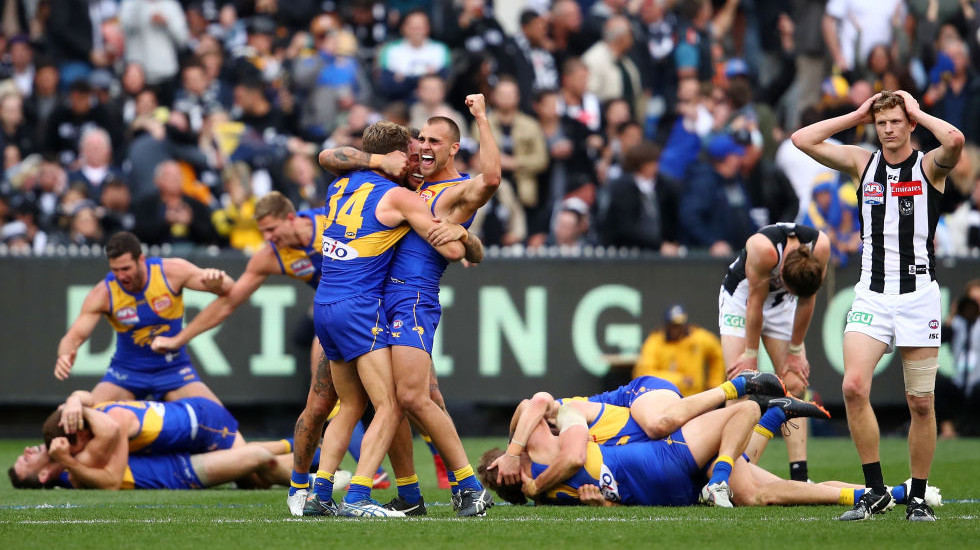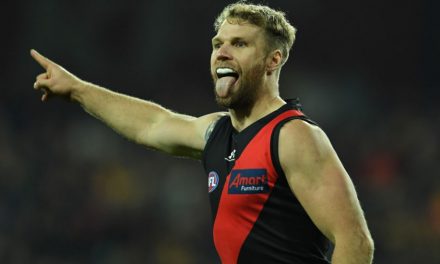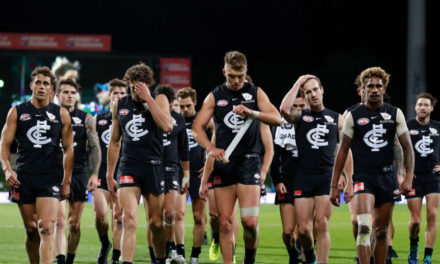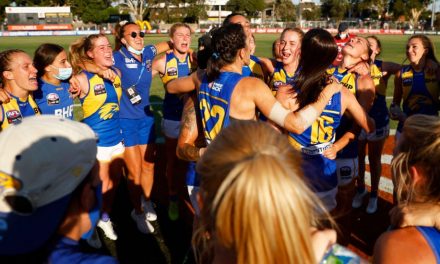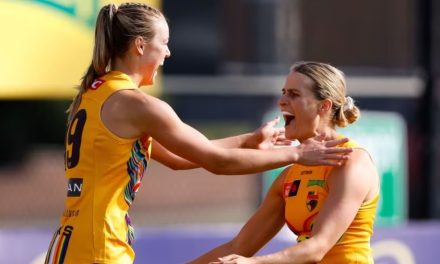Delight and devastation. The contrasting emotions of victor and vanquished at the final siren of Saturday’s epic grand final. Photo: AFL MEDIA
RoCo’s Wrap: Game emerges victorious in a great grand final
West Coast’s five-point win over Collingwood on Saturday is destined to be remembered as one of the greatest of grand finals. How great? Well, some historical context perhaps helps answer that question.
No team since Essendon in 1984 has won a grand final from further behind than were the Eagles when they trailed by 29 points at the 26-minute mark of the opening quarter.
No player since Carlton’s Fred Stafford all the way back in 1947 has kicked a goal in a grand final later than did West Coast’s Dom Sheed on Saturday to give his side the lead and win it a premiership.
And has any team led a grand final for as short a time as did West Coast (nine minutes) and still won? Certainly not in the time since such statistics have been kept.
It was an incredible afternoon of sporting drama. And while for me, Carlton’s 44-point comeback against Collingwood in 1970, which featured two great rivals, a record crowd, a record comeback, Alex Jesaulenko’s famous mark and Ted Hopkins’ four goals off the reserves bench, is still the greatest grand final of them all, this one definitely ranked in the top five.
It wasn’t just the finish or the comeback, though. This was a flag-decider which twisted this way and that.
From Collingwood’s flying start, to West Coast gradually regaining its composure to kick five of the next six goals, the Pies seizing control again at the start of a frantic final term with two goals in just 96 seconds, to the Eagles’ instant response.
It was a story of West Coast’s domination of general play in the second half with 38 to just 18 inside 50s, but Collingwood’s brave resistance under the assault, and its capacity to make what chances did come its way count.
Older Collingwood fans will note with a sigh the eerie similarities to the epic 1979 grand final loss to Carlton, also decided by five points with both sides locked on 11 goals and in which the Pies also kicked the first five goals without reply.
Many might even argue a Wayne Harmes-type controversy in the shape of Willie Rioli’s block on the Pies’ Brayden Maynard which allowed Sheed to mark.
Was it a free kick to Maynard? Personally, I was OK with the non-decision. I think there’s far more similar examples of blocks let go than paid, and in a game which all day umpires presided over with a “let it go” attitude, it was consistent with the spirit of the game.
Did Sheed play on after he marked? Again, borderline, but perhaps not enough steps forward after the mark before pulling up to be called on.
Where does his clutch shot rank in the pantheon of iconic sporting moments? Very, very high. The tightest of angles, time to consider the monumental importance of what he was about to execute, and when the ball hit his boot, just one minute 52 seconds left on the clock.
You can argue the toss about the order, but at the very least Sheed’s name will now clearly be mentioned alongside those of Ross “Twiggy” Dunne, whose late mark and goal tied the 1977 grand final, and Leo Barry, whose huge mark in the last few seconds ensured Sydney’s 2005 win.
This grand final was out of the top shelf, and to be honest, we needed it after a largely forgettable finals series, and a season which in patches was so tedious, not to mention the lowest scoring since 1968, that it spawned what now seem inevitable rule changes for next year.
It’s doubtful one game, albeit a grand final, is going to change the minds of the AFL when it comes to this hobby horse, but it did also provide some food for thought on that score. While pressure is football’s new black, the significance of this season’s most important play was hard to miss.
It featured Jeremy McGovern backing himself to take a critical big mark in the back-pocket and succeeding. His kick inboard to Nathan Vardy, who had several Collingwood opponents circling, was just as brave. Vardy’s kick to a contest saw arguably the mark of the day, a huge climb by Liam Ryan, who spotted and found Sheed in a forward-pocket.
Two great grabs, and, including the shot at goal, three pinpoint kicks. And kicking and key forwards to kick to have been cornerstones of the West Coast game style in 2018, coming through in the most important game of the year.
Sure, Collingwood’s pressure made the Eagles look wobbly early. But Josh Kennedy remained an important presence in the West Coast scoring zone, Jack Darling’s shocking first half was followed by a huge third quarter in which he took six marks, and in the last frenetic moments, it was fundamental hand and foot skills which won the day.
As so often happens in AFL football, will we now see other teams following the Eagles’ lead, loading up on talls and honing skills further? Maybe, maybe not. But it does at least raise the possibility that the game’s continued evolution hasn’t stalled irretrievably.
West Coast, for its part, has broken the run of five non-Victorian grand finalists losing to local teams on a Victorian ground. It has thrown off the weight of a lame display on the big stage three years ago in the toughest possible circumstances, a victory full of grit and resilience.
Collingwood is rightly devastated at having come so close with nothing to show for it. But this was an amazing season nonetheless for Nathan Buckley’s team, finding its mojo and a spirit for which most rivals would kill.
So it ended in tears, but tears as much of pride in having left absolutely nothing in the tank. Not many grand final losers walk from the MCG with heads held high, but Collingwood had every right to on Saturday, the feeling that this wasn’t an end, but very much a beginning for them.
And we should all feel a little privileged to have been witness to one of the great moments in Australian sport. You don’t often hear a pat phrase like “football was the real winner” without cringing a little, but on Saturday, it really did seem apt.

